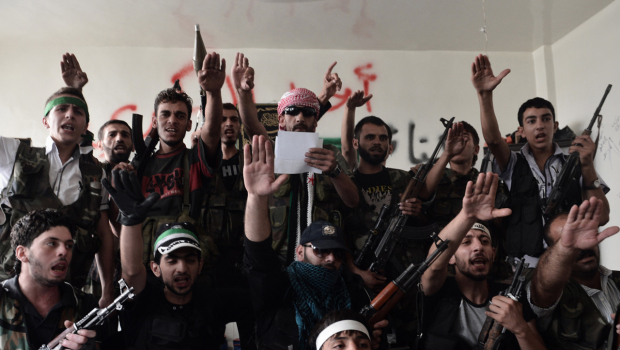
From John Irish, Reuters: Almost from the onset of the uprising Paris tried to develop internal networks and gain trust among opposition activists. Before recalling its ambassador from Damascus in March 2012, the embassy had been smuggling medicines clandestinely to makeshift hospitals and food for protesters.
Six months later, Foreign Minister Laurent Fabius announced a plan to aid "free zones" in northern Syria.
The objective was primarily to reach local communities no longer under Assad’s control and help them revive local administration and restore basic needs, such as bakeries.
Paris insisted on a strict system of traceability for how its cash was spent. For every dollar, receipts and as much photographic and video evidence as possible had to be provided. It also relied on informers who reported back.
Most of the "revolutionary councils" had civilian and military branches. The military wings were the embryo of the Free Syrian Army. It enabled Paris to begin mapping fighters.
"It wasn’t technical advice. It was first and foremost to develop links between the political opposition, defectors and rebel fighters so they could speak to each other and agree to work together," recalls one French official. . . .
The French insist that these humanitarian, medical and civilian networks have been tested and provide a "cartography" of where future help could go.
"One needs to have precise knowledge of these fragmented groups," said a French diplomat. "We have a slight advantage because for a long time we’ve had direct contacts in the liberated zones and have already delivered material."
Their primary interlocutor for the last six months has been the head of the Free Syrian Army, Salim Idriss, whom French officials hold in high regard. Non-lethal aid ranging from bullet proof vests, night vision goggles or communications equipment has gone through him.
But his credibility is under question. Without money, munitions and weapons, he is struggling to assert his authority on the disparate groups of fighters, some of whom have said he is rather like a "schoolteacher".
Resolving that, officials say, will need two things. First, countries that supply weapons to rebels must coordinate better and ensure they work solely through Idriss.
Secondly, Western nations that remain cautious in providing weapons must widen the scale of their help, either in terms of equipment or "technical assistance" such as through battle tactics or weapons training.
"We’ve tested a certain number of these FSA elements," French foreign ministry spokesman Philippe Lalliot said. "We’ve built up trust and it’s the similar types of assurances that we would like for weapons."
Ultimately the easiest way to ensure weapons do not fall into the wrong hands would be to find ways to track them. Fabius said last month that Paris was studying ways to monitor and neutralize weapons under certain conditions.
According to one official, options would include programming a time period for their use, limiting ammunition, placing global positioning systems on them or even turning them off from afar.
"I imagine that would only happen with more sophisticated weapons such as shoulder-fired MANPADs (man-portable air defense systems)," said Jeremy Binnie, Middle East and Africa editor for IHS Jane’s Defence Weekly.
"It is technically possible you could get something in there to disarm them, but how much cost and the time it’s going to take I think may be more of the issue." (photo: Aris Messinis/AFP/Getty)
Image: getty%206%2019%2013%20Syrian%20rebels.jpg

